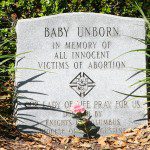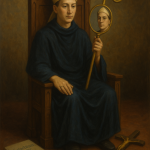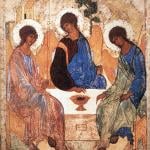Rome, Italy, Oct 21, 2016 / 10:19 am (CNA/EWTN News).- A fellow Jesuit who has known Fr. Arturo Sosa for more than 50 years has said the newly elected head of the order, while not always explicitly vocal, is critical of the current socialist government in Venezuela pioneered by Hugo Chavez. “(Father) Sosa thinks that in countries where everything depends on the government, true democracy is impossible,” Fr. Francisco Javier Duplá told CNA Oct. 19. This goes for the current situation of Nicolas Maduro’s socialist government in Venezuela, he said, adding that Fr. Sosa has been “more critical than with Chavez.” A professor for 30 years at the Andrés Bello Catholic University in Venezuela (UCAB), one of the country's largest universities, Fr. Duplá had Fr. Sosa as a student in Spanish literature when the latter was just 16-years-old. The two lived together for three years while Fr. Sosa was a philosophy student at UCAB, and Fr. Duplá served under Fr. Sosa during his time as provincial in Venezuela from 1996-2004. Fr. Duplá said that during Fr. Sosa’s time as provincial, under Chavez’s socialist regime, Fr. Sosa believed the late president’s intention “was sincere.” “Perhaps it was so,” he said, but noted that it didn’t take Fr. Sosa long to realize that “things in Venezuela weren’t going to change.” Fr. Sosa “was not openly critical” of Chavez from the beginning, because he expected the dictator “would modify his posture,” Fr. Duplá said. However, “Chavez was captured by strong adoration of himself.” Though he didn’t necessarily criticize Chavez publicly, Fr. Sosa wrote a number of articles in the Jesuit-run magazine “SIC,” in which “he criticized the course of government’s measures,” Fr. Duplá said, naming the so-called “misiones” of Fidel Castro, which offered food and medicine to the poor but demanded a total acceptance of their political ideas, as an example. Run by the “Gumilla Center of Investigation and Social Action”, which was founded by Jesuit priest Fr. Manuel Aguirre Elorriaga in 1938 to fight inequality, the SIC magazine features several pieces from Fr. Sosa both during his time as the publication’s director from 1979-1996, as well as his time as provincial. In the aftermath of Chavez’s stormy reign and the takeover of his successor, Nicolas Maduro, in 2013, Venezuela has been marred by violence and social and economic upheaval. Poor economic policies, including strict price controls, coupled with high inflation rates, have resulted in a severe lack of basic necessities such as toilet paper, milk, flour, diapers and medicines. Venezuela's socialist government is widely blamed for the crisis. Since 2003, price controls on some 160 products, including cooking oil, soap and flour, have meant that while they are affordable, they fly off store shelves only to be resold on the black market at much higher rates. The Venezuelan government is known to be among the most corrupt in Latin America, and violent crime in the country has spiked since Maduro took office after former president Chavez died from cancer in 2013. Demonstrations broke out in the country in January 2014 after Monica Spear, a former Miss Venezuela, was murdered along with her ex-husband on a highway near Caracas when their car broke down. Protests intensified after the attempted rape of a student shortly after Spear’s death, and since then Maduro’s government has jailed many peaceful protestors and political opponents. The regime is known to have committed gross abuses, including violence, against those who don’t share their political ideologies. As head of the Society of Jesus, Fr. Sosa “can influence changes in Venezuela in order to go out of this disastrous government,” Fr. Duplá said. Fr. Sosa, 67, was elected as the 31st Superior General of the Jesuits Oct. 14, marking the first time a Latin American has led the Society; moreover, he takes the helm under the Church’s first Jesuit and Latin American Pope. In an Oct. 18 news conference with journalists in Rome about election, Fr. Sosa spoke directly about the situation in Venezuela, explaining that the political movement Chavez pioneered and which is now headed by Maduro, is “based on revenues and doesn't sustain itself, politically, economically, or ideologically." He said that neither does the Venezuelan opposition have a project that allows one to think “of a future that isn't based on revenues, which is the only way to progress long-term and to better the situation of Venezuelans." To understand what is happening in Venezuela, he said, it's necessary to remember that it's a country which “lives on oil revenue, and that this oil revenue is exclusively administered by the state.” “(This) makes the formation of a democratic society very difficult,” he said, explaining that “normally a democratic society has its foundation in that the state is subordinate to the citizens. In a democracy, it is the citizens who produce and maintain the state.” However, in the case of Venezuela, “the fact that oil sales are exclusively directed by the state makes it the state that maintains society. Thus, this democratic creation becomes difficult,” Fr. Sosa said. Despite Fr. Duplá’s personal experience with Fr. Sosa, some have claimed the new Jesuit father general’s position in politics, both now and in the past, is in fact aligned to the Chavez-Maduro regime, supporting Marxist principals promoted by Venezuela’s socialist government as well as a liberation theology rooted in Marxism. Liberation theology sprung up in Latin America in the 1950s, and some forms were a Marxist interpretation of the Gospel, focusing on freedom from material poverty and injustice rather than giving primacy to spiritual freedom. Under Cardinal Joseph Ratzinger, the Congregation of the Doctrine of the Faith twice issued instructions regarding liberation theology: 1984's Libertatis nuntius drew attention to “the deviations, and risks of deviation … brought about by certain forms of liberation theology which use, in an insufficiently critical manner, concepts borrowed from various currents of Marxist thought.” This was followed in 1986 by Libertatis conscientia, which presented Christian doctrine on freedom and liberation, and was meant to be read together with its predecessor. In an Oct. 16 post on his blog “L’Espresso,” veteran Vatican analyst Sandro Magister said that in a 1978 article for the SIC magazine, Fr. Sosa had called a Marxist interpretation of the Christian faith and liberation theology both “legitimate” and “necessary.” However, Magister is known not to be the most ardent admirer of some members of the Society of Jesus. In the same article Magister refers to on his blog, Fr. Sosa explains that a Marxist interpretation of the Christian faith was “legitimate” in the sense that at the time, Christians existed who stuck to their faith, yet “at the same time proclaim themselves Marxist and are committed in the transformation of the capitalist society into a socialist society.” Later on in the article Fr. Sosa said that “a Marxist meditation of the Christian faith would be the worst instrumentalization that could be done to a religion – in relation with God – which, in putting the Crucified Jesus at its center, breaks with any intent of a human construction of God and affirms him as the one who is always unprecedented in his potential.” Referring to Fr. Sosa’s own position, Fr. Duplá said he wasn’t necessarily closed to liberation theology, and that when it comes to reconciling the idea with the Church, a careful, nuanced distinction must be made between the intent of liberation theology and its Marxist beginnings. “There are many Jesuits sympathizing with liberation theology in its intentions, but not in its Marxist foundations,” Fr. Duplá said, explaining that in his perspective, liberation theology seeks “to give a religious basis to a better society.” “Religious faith and justice must be together,” he said, adding that he believes Fr. Sosa’s own interpretation of liberation theology “follows this way” of thinking. In his comments to journalists Oct. 18, Fr. Sosa said that although he was “very surprised” by his election as Superior General, he feels serene and grateful, and is ready to accept the task with joy. He noted how the general congregation didn’t end with his election, but is in fact still rolling forward with the selection of his new “governing team” and the discernment of the path they will take in the future. Fr. Sosa highlighted faith and spiritual depth as the “two legs” with which the Society walks in carrying out their mission, and which mark out the line he’ll take in moving forward in his role as Superior General. While the way in which he will govern the Society is “still not clear,” Fr. Sosa stressed that “our mission is not being put into question.” “The general congregations after the Second Vatican Council have defined our mission clearly: service of the faith and the promotion of justice, keeping in mind dialogue and cultural diversity. This remains undisputable for the Society,” he said. The greatest challenge the Society faces today, he said, is that of “reconciliation … in all regions of the world they feel split, this deep wound that divides us and it is also felt in the face of serious situations.” Conflicts such as the ones in Venezuela, Syria, Iraq, as well as “the wars which aren’t spoken of” and forced migration are all examples of the urgent need for reconciliation, he said. “The Kingdom of God cannot be present, cannot exist among us if we don’t recognize it, if we can’t live in peace, if we can’t reconcile ourselves and if we can’t reconcile with the earth which we risk ruining,” he said, explaining that the call to reconcile is “a great challenge for us.” Read more
















